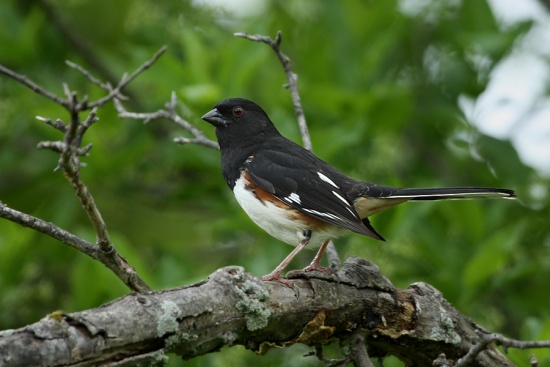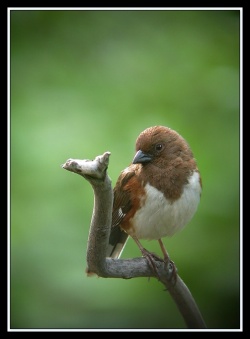(References updated) |
(Picture of adult male (red eyed). References updated. Some picture Galleried) |
||
| Line 1: | Line 1: | ||
| + | [[Image:134931081 I3IwKZ5z IMG 9971 2.jpg|thumb|550px|right|Male (red eyed)<br />Photo by {{user|lunatic|lunatic}}<br />[[New Jersey]], [[USA]], May 2011]] | ||
;[[:Category:Pipilo|Pipilo]] erythrophthalmus | ;[[:Category:Pipilo|Pipilo]] erythrophthalmus | ||
| − | |||
==Identification== | ==Identification== | ||
'''Male''' | '''Male''' | ||
| Line 18: | Line 18: | ||
Formerly considered conspecific with the [[Spotted Towhee]] as the Rufous-sided Towhee. | Formerly considered conspecific with the [[Spotted Towhee]] as the Rufous-sided Towhee. | ||
====Subspecies==== | ====Subspecies==== | ||
| − | [[Image:Florida_Eastern_Towhee_on_Truck_by_bobsofpa.jpg|thumb| | + | [[Image:Florida_Eastern_Towhee_on_Truck_by_bobsofpa.jpg|thumb|350px|White-eyed (Florida) form<br />Photo by {{user|bobsofpa|bobsofpa}}<br />[[Everglades National Park]], [[Florida]], [[USA]], February 2007]] |
There are 4 subspecies<sup>[[#References|[1]]]</sup>:<br /> | There are 4 subspecies<sup>[[#References|[1]]]</sup>:<br /> | ||
Eastern Towhee (Red-eyed) | Eastern Towhee (Red-eyed) | ||
| Line 32: | Line 32: | ||
==Habitat== | ==Habitat== | ||
Deciduous forest and woodland edges, scrub, fields and gardens. | Deciduous forest and woodland edges, scrub, fields and gardens. | ||
| + | ==Gallery== | ||
| + | Click on image to enlarge | ||
| + | <gallery>Image:Eastern_Towhee_male.jpg|Juvenile<br />Photo by {{user|mmdnje|mmdnje}}<br /> Atlanta, [[Georgia]], [[USA]]<br /> | ||
| + | Image:IMG 66331.jpg|Juvenile<br />Photo by {{user|Fowl+Mouth|Fowl Mouth}}<br />[[Connecticut]], [[USA]], July 2010 | ||
| + | </gallery> | ||
==Behaviour== | ==Behaviour== | ||
| − | |||
====Breeding==== | ====Breeding==== | ||
They nest in low vegetation or on the ground under shrubs. | They nest in low vegetation or on the ground under shrubs. | ||
| Line 39: | Line 43: | ||
Seedeaters, they readily visit garden feeders. | Seedeaters, they readily visit garden feeders. | ||
==References== | ==References== | ||
| − | #{{Ref- | + | #{{Ref-Clements6thOct12}}#Wikipedia |
#BF Member observations | #BF Member observations | ||
{{ref}} | {{ref}} | ||
Revision as of 21:50, 4 March 2013
- Pipilo erythrophthalmus
Identification
Male
- Rufous sides
- Black upperparts, and breast
- White underparts
- White outer tail feathers are seen in flight
Female
- Brownish upperparts
- Rufous sides
- White underparts
- Similar patterned to male, only black areas are replaced with brown
Distribution
Eastern United States north to New York and Massachusetts.
Taxonomy
Formerly considered conspecific with the Spotted Towhee as the Rufous-sided Towhee.
Subspecies
There are 4 subspecies[1]:
Eastern Towhee (Red-eyed)
- P. e. erythrophthalmus:
- Eastern North America (southern Canada to Gulf Coast)
- P. e. canaster:
Eastern Towhee (White-eyed)
- P. e. rileyi:
- P. e. alleni:
- Central peninsula Florida to tip of peninsula
Habitat
Deciduous forest and woodland edges, scrub, fields and gardens.
Gallery
Click on image to enlarge
Juvenile
Photo by Fowl Mouth
Connecticut, USA, July 2010
Behaviour
Breeding
They nest in low vegetation or on the ground under shrubs.
Diet
Seedeaters, they readily visit garden feeders.
References
- Clements, J. F., T. S. Schulenberg, M. J. Iliff, B.L. Sullivan, C. L. Wood, and D. Roberson. 2012. The eBird/Clements Checklist of Birds of the World. 6th ed., with updates to October 2012. Ithaca: Cornell Univ. Press. ISBN 978-0801445019. Spreadsheet available at http://www.birds.cornell.edu/clementschecklist/downloadable-clements-checklist
- Wikipedia
- BF Member observations
Recommended Citation
- BirdForum Opus contributors. (2024) Eastern Towhee. In: BirdForum, the forum for wild birds and birding. Retrieved 20 May 2024 from https://www.birdforum.net/opus/Eastern_Towhee
External Links








